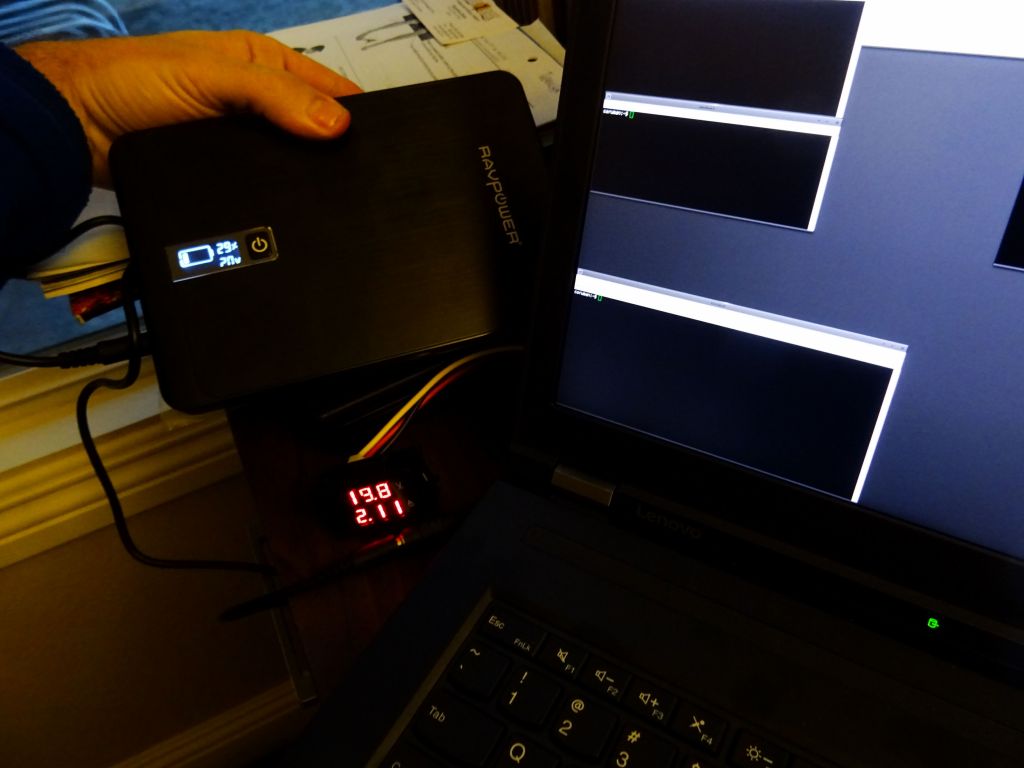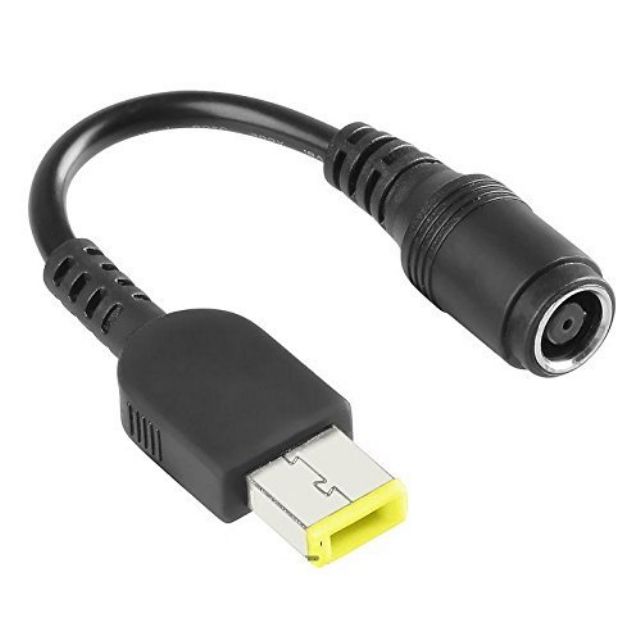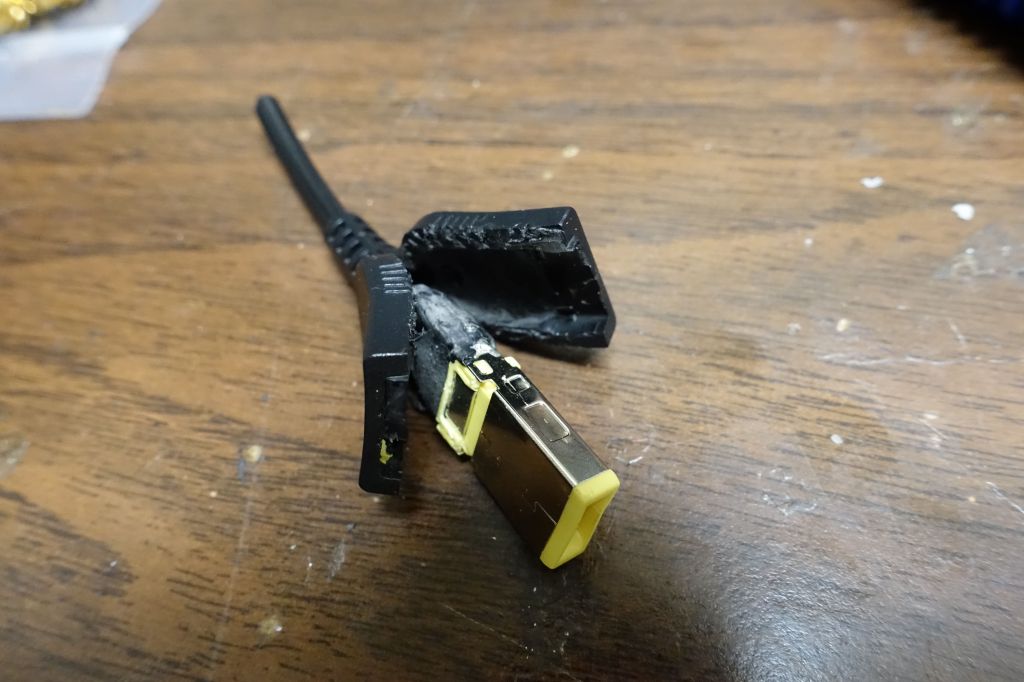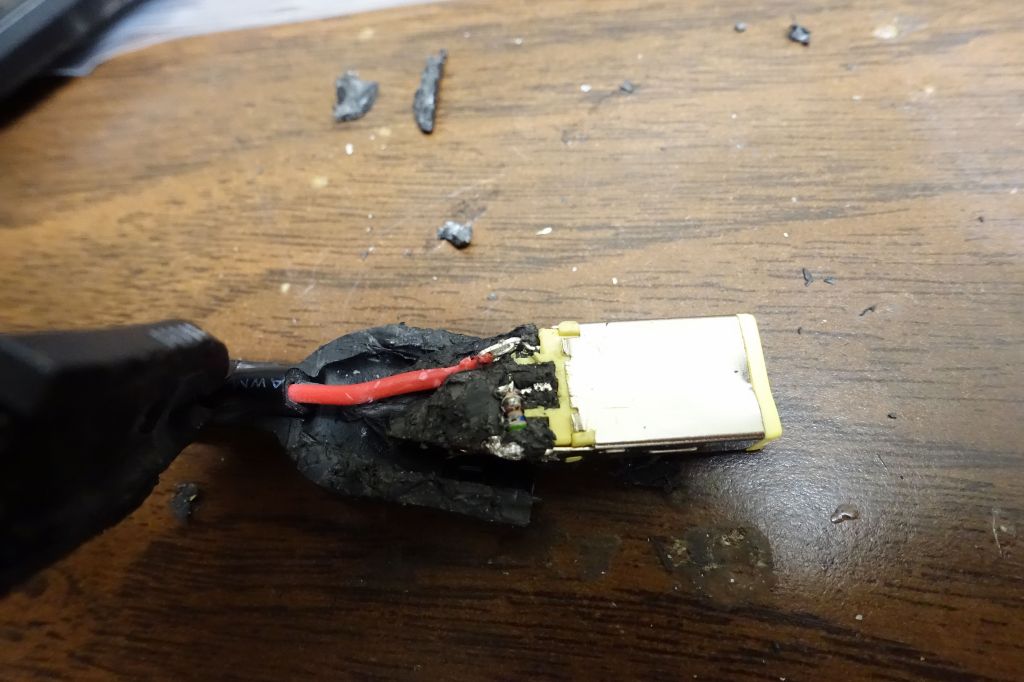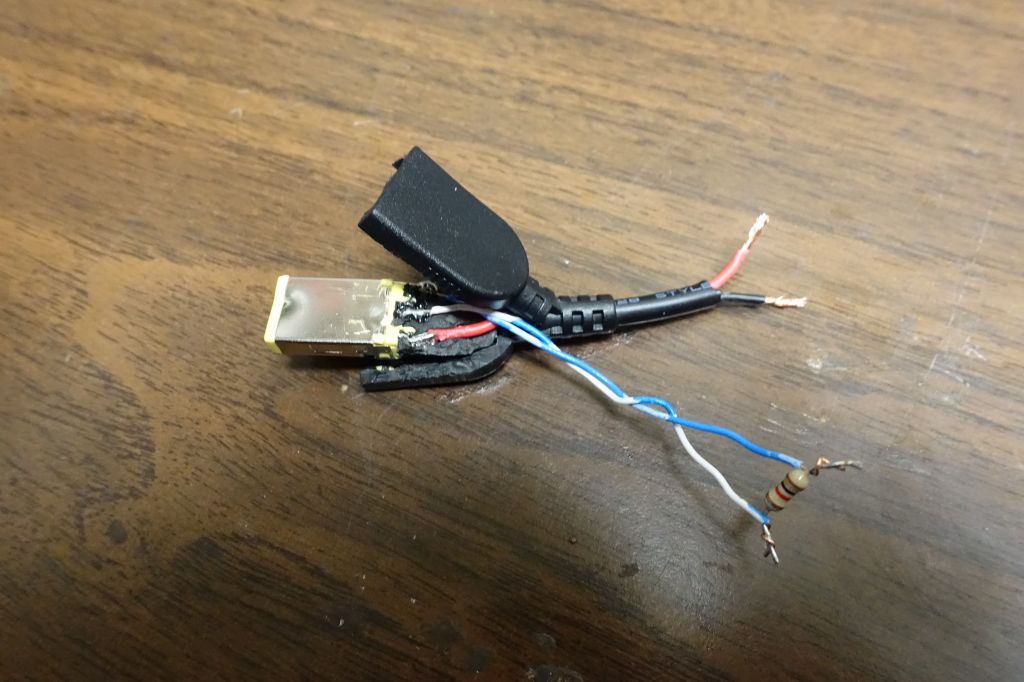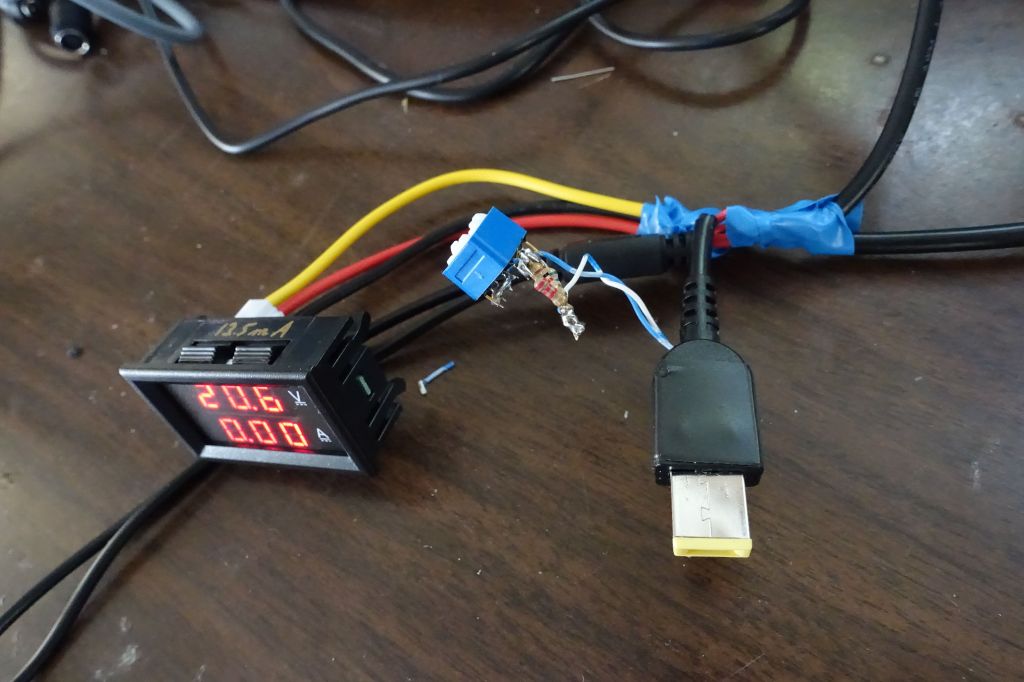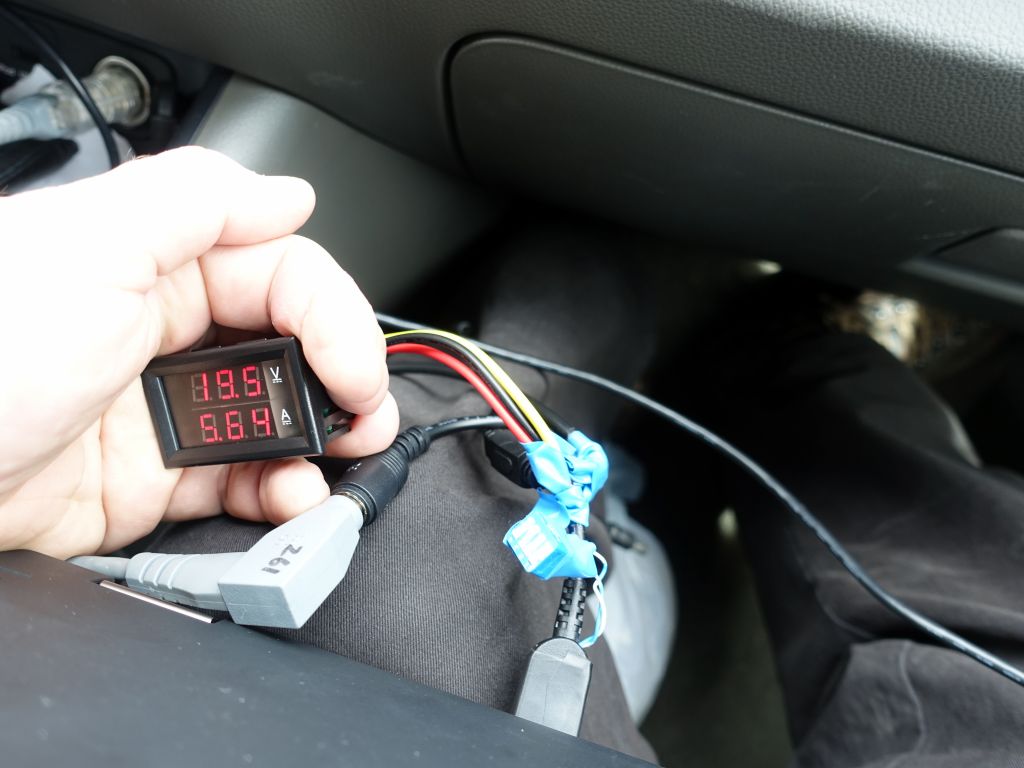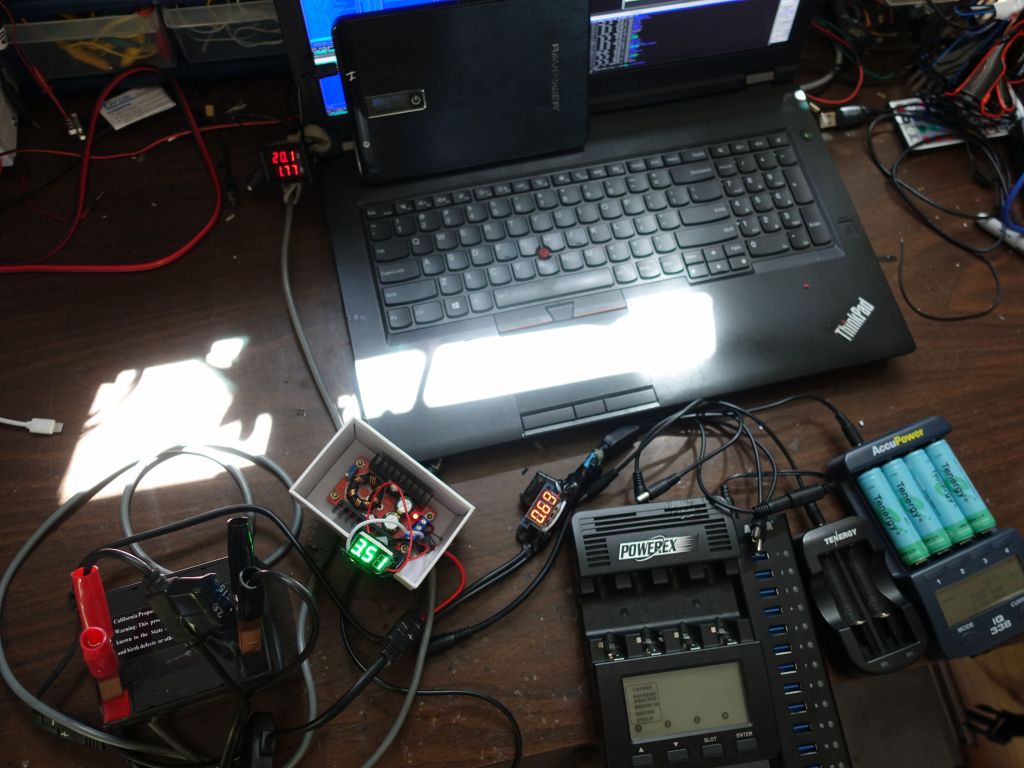So far I had been using the Lenovo T540 which I got because of its 3K 15" screen, but I really hated that generation of thinkpads due to the lack of mouse buttons (hence the bluetack on the pad, used to know where I can click to emulate buttons 1, 2, and 3), and someone who decided it would be great to remove almost all LEDs, including caps lock, and hard drive activity.
So when the P70 came out, I was very interested in it, not just because they fixed the LED and mouse button situation, but especially because of the first thinkpad with a 4K screen. The P50 has the same resolution in 15", but I figured if I'm going to have 4K's worth of dots (8 million pixels), I might as well have a 17" screen.
So let's be honest and say that it is a big a heavy laptop, but that was an acceptable tradeoff for me. CPU wise, it's actually no faster than the T540, but the big new thing is the 2 M2 slots in addition to capacity for 2 2.5" Sata drives, like the T540 (one goes in place of the DVD Burner using a special tray).
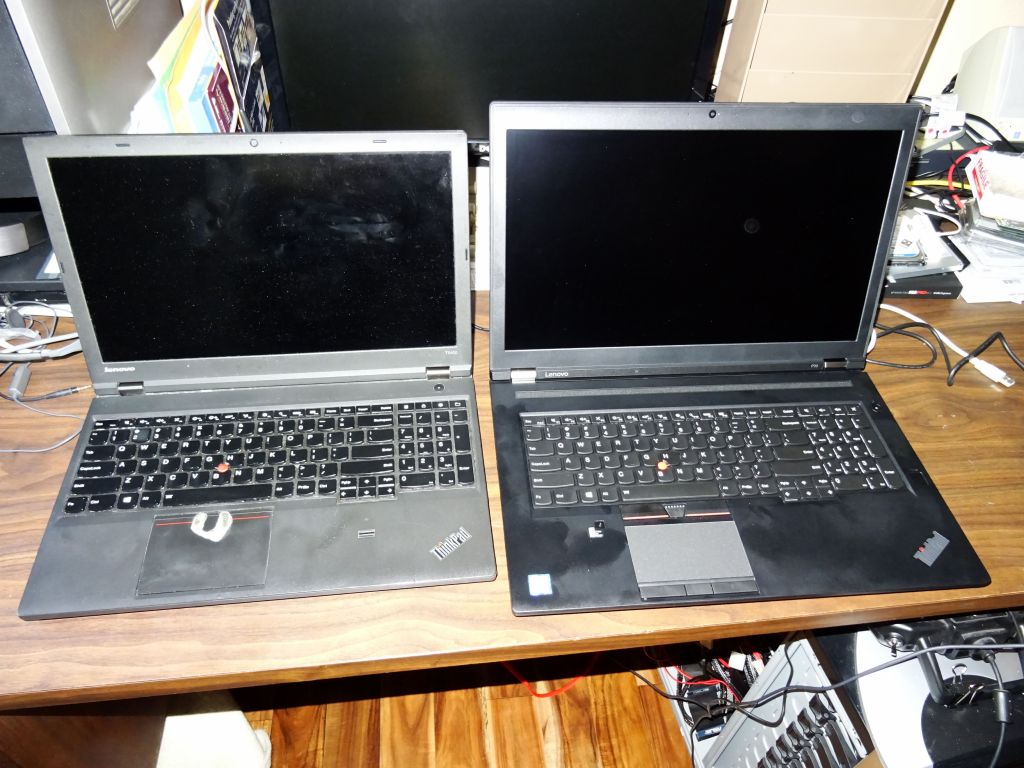
yes, it's big
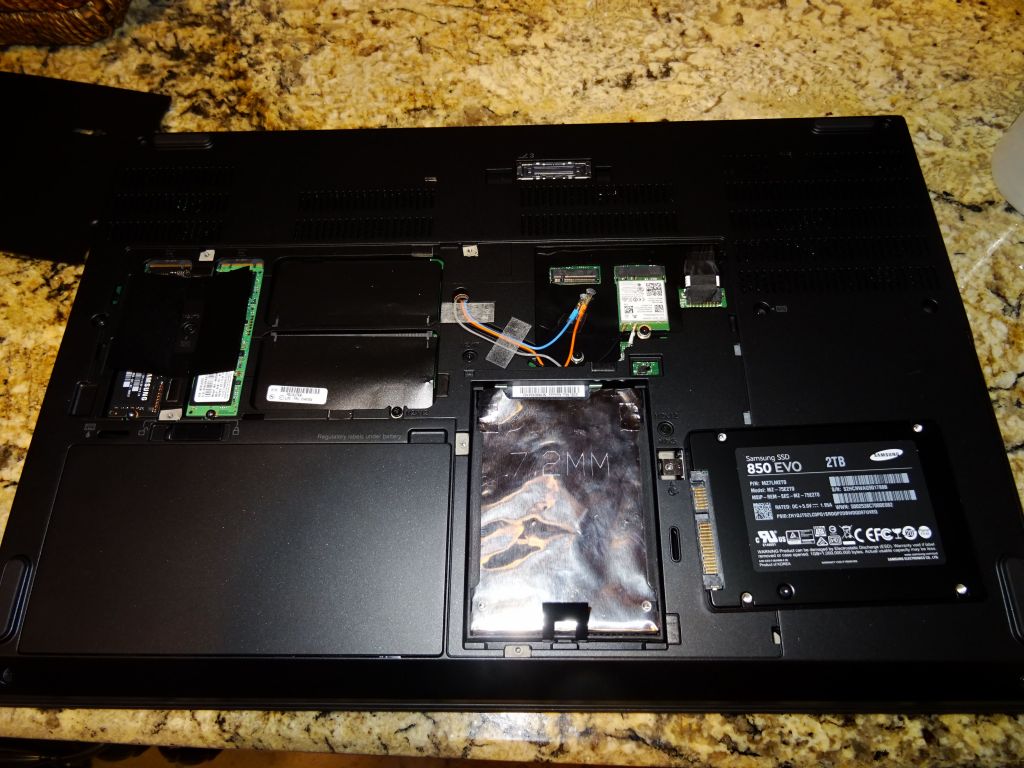
the 2 M2 slots are on the right, and the 2nd drive goes under where the SSD is visible in this picture
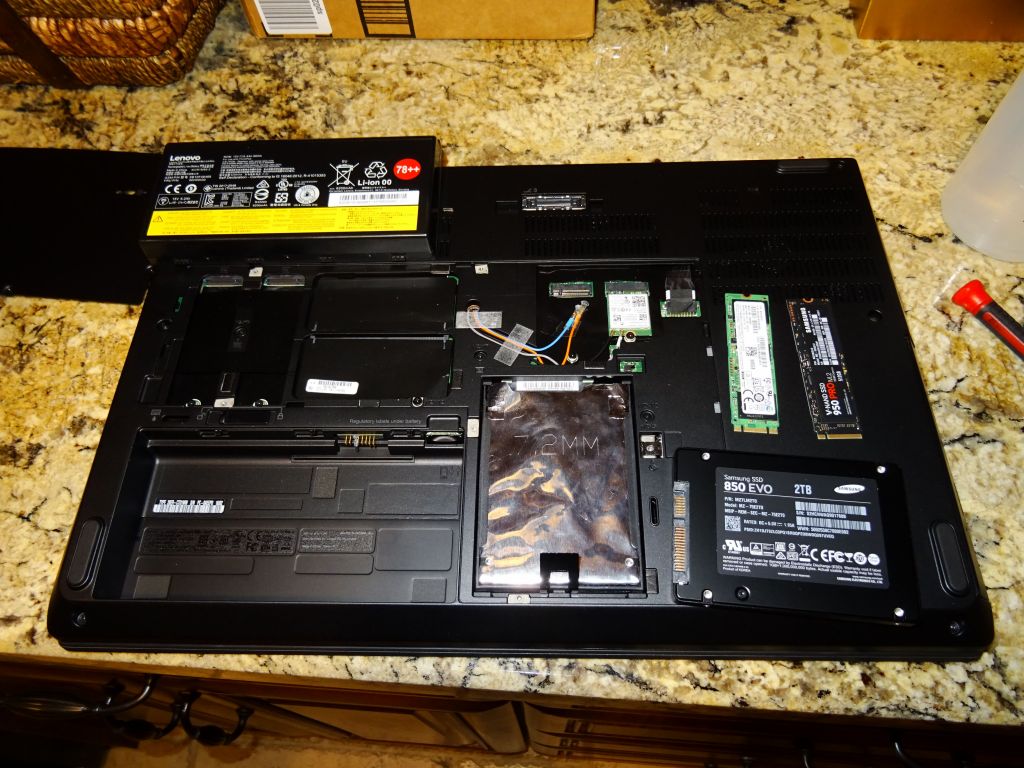
size of M2 sticks compared to the SSD (with free shot of the 96Wh battery :) )
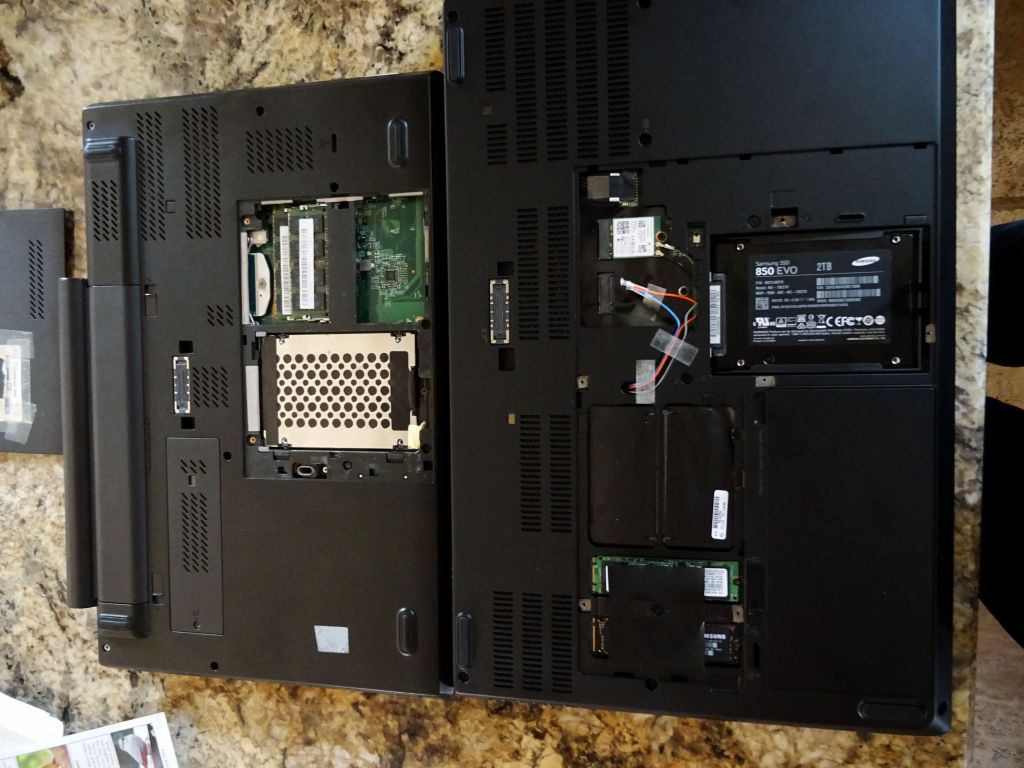
Comparison with the T540
So the P70 can currently house 5TB of storage and I was interested to see how well the M2 slots worked compared to the Sata ones under linux. First thing to note is that currently M2 slots can only house 512MB of storage each vs 2TB for the 2.5" Sata slots that have more room. Sadly, Lenovo is still not selling the Drive Caddy Adapter for the P70, but the good news is that you can buy this $17 Soogood 2nd HDD SSD Hard Drive Caddy Adapter Use For Lenovo Thinkpad T440p T540p W540p from Amazon, unscrew the little tab from the DVD Drive, screw it on the drive caddy adapter, and it'll work in the P70.
To try that out, I got the following (with price by GB as of 2016/02), in increasing price per GB:
- 4.6c/GB: Seagate 2TB Laptop HDD SATA 6Gb/s 32MB Cache 2.5-Inch Internal Bare Drive (ST2000LM003)
- 30c/GB: SATA6G: Samsung 850 EVO 2 TB 2.5-Inch SATA III Internal SSD (MZ-75E2T0B/AM)
- 33c/GB: M2/SATA Samsung 850 EVO 500 GB M.2 3.5-Inch SSD (MZ-N5E500BW)
- 64c/GB: M2/NVMe: Samsung 950 PRO -Series 512GB PCIe NVMe - M.2 Internal SSD 2-Inch MZ-V5P512BW
So it's interesting to note that SSDs still cost 6.5x more than a hard drive (actually I was surprised to see how cheap the 2.5" 2TB hard drive was). Next, it's good to know that M2/Sata SSDs cost about the same price per GB than full size Sata SSDs. And last, at twice the price, the M2/NVMe SSD is no bigger than the SATA M2 version, but clearly more expensive. It's supposed to be up to 4 times faster in bulk transfer rate due to the use of 4 PCI lanes, but I was curious to see how much faster it would actually be for real use with linux.
First, is looking at support. To make things interesting, I decided to make the NVMe SSD my boot drive. The Thinkpad bios of course supports it fully, but a big gotcha is that it'll only boot if you use a GPT partition with EFI. Setting that up from scratch was a pain, but I got through it, and it's out of topic for this post.
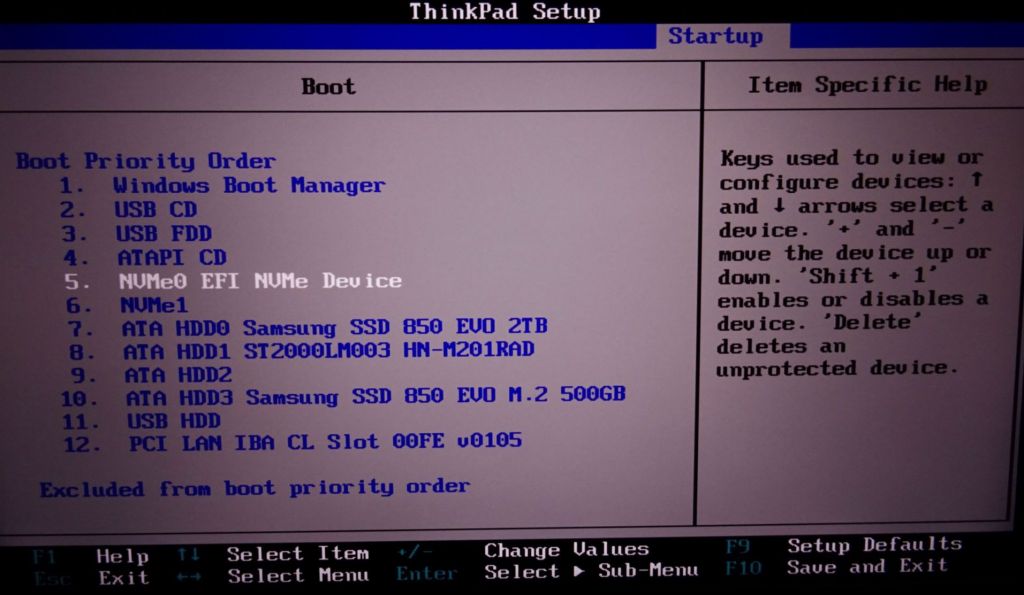
Next, is linux support. Thankfully linux has supported NVME for a while now. I just set CONFIG_BLK_DEV_NVME=y in my kernel so that I didn't have to worry about the module being in my initrd. Device partitions show up as /dev/nvme0n1p1 and so forth.
Now, the benchmarks. For my main filesystems, I have btrfs on top of dmcrypt, created with:
cryptsetup luksFormat --align-payload=8192 -s 256 -c aes-xts-plain64 /dev/device
In the tests below, I did used hdparm, iozone, and 2 kinds of dd, ddd with data, and dd0 copying just /dev/zero:
ddd test: sync; dd if=/mnt/ram/file of=file bs=100M count=100 conv=fdatasync; dd if=file of=/dev/null bs=100M
dd0 test: sync; dd if=/dev/zero of=file bs=100M count=100 conv=fdatasync; dd if=file of=/dev/null bs=1M
Let me start with the summary conclusions first, since this is what most people probably care about:
NVMe is faster for big contiguous I/O, even through dmcrypt, that's good.
M2 NVMe and M2 sata do not seem to go through buffer cache for writes, but SATA/6GB does
When using buffer cache, SATA/6GB beats NVMe/M2 and SATA/M2 by a lot on block reads. Why?
For random I/O, NVMe is up to 50% faster, and faster with ext4 than btrfs
Encrypted NVMe is a bit faster than non encrypted Sata/M2
At $328 for 512GB M2/NVMe vs $168 for 500GB M2/Sata, unless you're doing big contiguous I/O, the 2x price difference is hard to justify, cached I/O and random I/O are not significantly faster on NVMe.
More detailled summaries related to the test results below:
NVMe only really looks faster on big block sequential read/write (indeed 4X read, 2X write). On Random I/O, it's no faster. Other overheads seem to kill its performance advantage.
2TB Sata 6GB SSD is faster for read/write encrypted than NVMe is non encrypted (except hdparm). Looks like the block caching layer works better for Sata than NVMe?
iozone through block cache is faster on M2/SATA than M2/NVMe, very weird.
iozone direct I/O shows NVMe is fastest (by 50% only) and external SATA just a bit faster than M2/Sata. Clearly the block caching layer hides differences for iozone.
when using dmcrypt, NVMe is only marginally faster in iozone than Sata/M2 or Sata/6G
kernel build speed is same on SATA/M2 and NVMe/M2, encrypted or not, but SATA6G is 10% faster (probably the same effect that block cache works better on SATA/6G than SATA/M2 or NVMe/M2)
Thankfully on big sequential IO (ddd test), NVMe finally shows being 4x faster on read, and 2.5x faster on write.
ext4 does better on iozone -I (directIO) than btrfs, 2x as fast on random read for NVMe
So there you go. I realize that my test suite may not have been perfect, but hopefully the results are helpful to others. I'm hoping linux will get fixed, or that I can find a tunin g parameter to bridge the gab in cached IO speed between Sata 6G 2.5" and M2 slots. Below are test results in more details are you go down the page.
Here are test results for cached IO:
SATA/M2 dmcrypt SATA/M2 NVMe dmcrypt NVMe SATA6GB/dmcrypt
hdparm -t 534MB/s 517MB/s 1307MB/s 2140MB/s 534MB/s
ddd 10GB read 550MB/s 560MB/s 2000MB/s 2400MB/s 550MB/s
ddd 10GB write 500MB/s 503MB/s 1300MB/s 1200MB/s 506MB/s
dd with /dev/zero hits optimizations that actually penalize NVMe:
dd0 10GB read 7GB/s 6.7GB/s 2.3GB/s 4.4GB/s 6.6GB/s
dd0 10GB write 495MB/s 503MB/s 1.3GB/s 1.3GB/s 2.0GB/s
iozone -e -a -s 4096 -i 0 -i 1 -i 2 (cache makes Sata6G faster than M2, weird):
ioz read 4KB 1760MB/s 1790MB/s 675MB/s 766MB/s 7863MB/s
ioz write 4KB 268MB/s 298MB/s 295MB/s 291MB/s 777MB/s
ioz ranread4KB 5535MB/s 7392MB/s 3185MB/s 7261MB/s 7892MB/s
ioz ranwrite4KB 288MB/s 329MB/s 205MB/s 381MB/s 796MB/s
For comparison, I then used directio to bypass the caching layer:
iozone -I -e -a -s 4096 -i 0 -i 1 -i 2 (direct IO):
SATA/M2 dmcrypt SATA/M2 NVMe dmcrypt NVMe SATA6GB
dmcrypt notcrypted
btrfs btrfs ext4 btrfs btrfs ext4 btrfs ext4
ioz read 4KB 255MB/s 303MB/s 408MB/s 303MB/s 396MB/s 562MB/s 310MB/s 379MB/s
ioz write 4KB 195MB/s 238MB/s 344MB/s 257MB/s 358MB/s 361MB/s 233MB/s 365MB/s
ioz ranread4KB 305MB/s 351MB/s 482MB/s 476MB/s 699MB/s1434MB/s 309MB/s 475MB/s
ioz ranwrite4KB 265MB/s 223MB/s 392MB/s 260MB/s 217MB/s 315MB/s 254MB/s 366MB/s
Details of each test, per type of drive;
===============================================================================
saruman M2 SATA 512GB encrypted btrfs
saruman:/tmp# hdparm -t /dev/mapper/cryptroot
Timing buffered disk reads: 1604 MB in 3.00 seconds = 534.03 MB/sec
iozone -e -a -s 4096 -i 0 -i 1 -i 2:
random random
kB reclen write rewrite read reread read write
4096 4 257076 281089 1761711 6094733 6066754 290373
4096 512 277108 295167 1588844 8426437 11128258 318731
4096 4096 268940 308248 1760087 8062616 8377131 320802
iozone -I -e -a -s 4096 -i 0 -i 1 -i 2:
4096 4 38626 45227 102236 111141 30936 64317
4096 512 138467 128878 134674 137832 140067 126248
4096 4096 195439 273100 255379 307300 305605 265093
saruman:/mnt/mnt# sync; dd if=/dev/zero of=file bs=100M count=100 conv=fdatasync; dd if=file of=/dev/null bs=1M
10485760000 bytes (10 GB) copied, 21.1761 s, 495 MB/s
10485760000 bytes (10 GB) copied, 1.49373 s, 7.0 GB/s
kernel 4.4.1 make -j8:
real 17m54.712s
user 126m26.620s
sys 6m21.948s
btrfs send/receive encrypted partition to non encrypted, 87GB: 10mn30
saruman M2 SATA non encrypted btrfs
-----------------------------------
saruman:/mnt/mnt4# hdparm -t /dev/sdc4
/dev/sdc4:
Timing buffered disk reads: 1554 MB in 3.00 seconds = 517.93 MB/sec
iozone -e -a -s 4096 -i 0 -i 1 -i 2:
random random
kB reclen write rewrite read reread read write
4096 4 285020 297565 1739944 7434579 6605595 305785
4096 512 310937 336617 1298278 3703511 5483860 299416
4096 4096 298433 317101 1790911 7392988 7434579 337476
iozone -I -e -a -s 4096 -i 0 -i 1 -i 2:
4096 4 47219 93497 118900 126065 39160 86462
4096 512 214381 213388 194307 209215 206951 209289
4096 4096 238792 221839 303768 352951 351342 223618
ext4 iozone -I -e -a -s 4096 -i 0 -i 1 -i 2:
4096 4 119524 146035 150173 159105 53090 140697
4096 512 358954 354810 366466 423088 419760 375542
4096 4096 344087 398828 408259 478337 482569 392487
saruman:/mnt/mnt3# sync; dd if=/dev/zero of=file bs=100M count=100 conv=fdatasync; dd if=file of=/dev/null bs=1M
10485760000 bytes (10 GB) copied, 20.8537 s, 503 MB/s
10485760000 bytes (10 GB) copied, 1.55651 s, 6.7 GB/s
kernel 4.4.1 make -j8:
real 17m55.612s
user 126m31.952s
sys 6m27.452s
********************************************************************************
saruman M2 NVMe 512GB encrypted btrfs
saruman:/tmp# hdparm -t /dev/mapper/cryptroot2
/dev/mapper/cryptroot2:
Timing buffered disk reads: 3924 MB in 3.00 seconds = 1307.56 MB/sec
iozone -e -a -s 4096 -i 0 -i 1 -i 2:
random random
kB reclen write rewrite read reread read write
4096 4 284205 341651 742181 6195843 6178018 341101
4096 512 314351 319573 864883 8865630 8902382 384993
4096 4096 295741 201042 675234 3281854 3185110 205974
iozone -I -e -a -s 4096 -i 0 -i 1 -i 2:
4096 4 80042 83160 122616 127129 41421 53963
4096 512 168713 153333 167710 209923 198123 168026
4096 4096 257968 258566 303023 490828 476440 260014
saruman:/mnt/mnt2# sync; dd if=/dev/zero of=file bs=100M count=100 conv=fdatasync; dd if=file of=/dev/null bs=1M
10485760000 bytes (10 GB) copied, 8.01494 s, 1.3 GB/s
10485760000 bytes (10 GB) copied, 4.63397 s, 2.3 GB/s
kernel 4.4.1 make -j8:
real 17m57.513s
user 126m58.360s
sys 6m25.164s
btrfs send/receive encrypted partition to non encrypted, 87GB: 7mn
(33% faster than Sata M2)
saruman M2 NVMe non encrypted btrfs
-----------------------------------
saruman:/mnt/mnt4# hdparm -t /dev/nvme0n1p4
/dev/nvme0n1p4:
Timing buffered disk reads: 6422 MB in 3.00 seconds = 2140.38 MB/sec
iozone -e -a -s 4096 -i 0 -i 1 -i 2:
random random
kB reclen write rewrite read reread read write
4096 4 274808 271851 684271 2634219 2280673 177630
4096 512 290191 336755 668196 3362795 4039655 184779
4096 4096 291427 340345 766588 7355007 7261741 381768
iozone -I -e -a -s 4096 -i 0 -i 1 -i 2:
4096 4 94814 117116 147645 159695 44075 108039
4096 512 271130 267800 239969 325933 301841 271062
4096 4096 358602 275933 396591 719099 699939 217665
ext4 iozone -I -e -a -s 4096 -i 0 -i 1 -i 2:
4096 4 107281 200735 205900 263035 54832 124219
4096 512 537478 374641 525060 1173664 1139338 558807
4096 4096 361545 526137 562632 1483477 1434069 315883
saruman:/mnt/mnt4# sync; dd if=/dev/zero of=file bs=100M count=100 conv=fdatasync; dd if=file of=/dev/null bs=1M
10485760000 bytes (10 GB) copied, 7.90653 s, 1.3 GB/s
10485760000 bytes (10 GB) copied, 2.35863 s, 4.4 GB/s
kernel 4.4.1 make -j8:
real 17m54.221s
user 126m46.264s
sys 6m10.592s
********************************************************************************
saruman Samsung Evo 850 2TB SSD encrypted btrfs
hdparm -t
Timing buffered disk reads: 1606 MB in 3.00 seconds = 534.87 MB/sec
iozone -e -a -s 4096 -i 0 -i 1 -i 2:
random random
kB reclen write rewrite read reread read write
4096 4 513924 738957 8586475 9144037 8017464 697665
4096 512 772100 820362 9287391 10136778 10586522 840551
4096 4096 719099 777517 7863339 8047509 7892238 796108
iozone -I -e -a -s 4096 -i 0 -i 1 -i 2
4096 4 76626 47961 92886 80947 36063 63788
4096 512 135087 138998 143127 150981 144393 132219
4096 4096 233245 234058 310797 311552 309855 254080
ext4 iozone -I -e -a -s 4096 -i 0 -i 1 -i 2 (unencrypted)
4096 4 118013 141212 130575 111534 42343 138654
4096 512 336347 312192 332847 414404 424542 342707
4096 4096 365227 364638 379298 484160 475122 366536
saruman:/tmp# sync; dd if=/dev/zero of=file bs=100M count=100 conv=fdatasync; dd if=file of=/dev/null bs=1M
10485760000 bytes (10 GB) copied, 5.23919 s, 2.0 GB/s
10485760000 bytes (10 GB) copied, 1.58287 s, 6.6 GB/s
kernel 4.4.1 make -j8:
real 16m4.305s
user 104m0.816s
sys 7m2.832s
